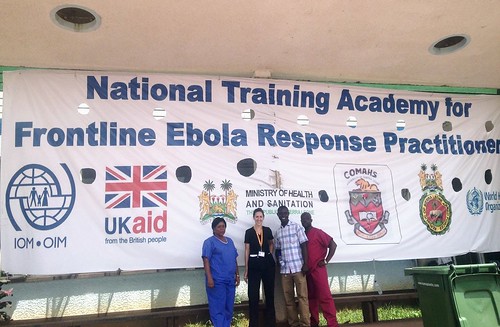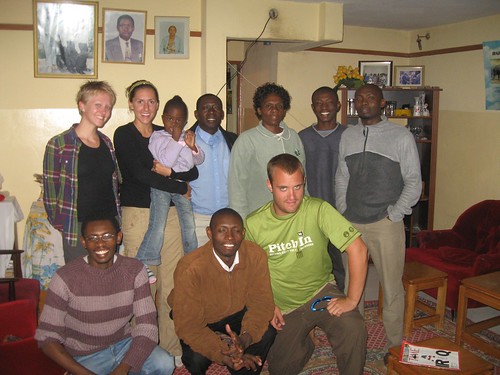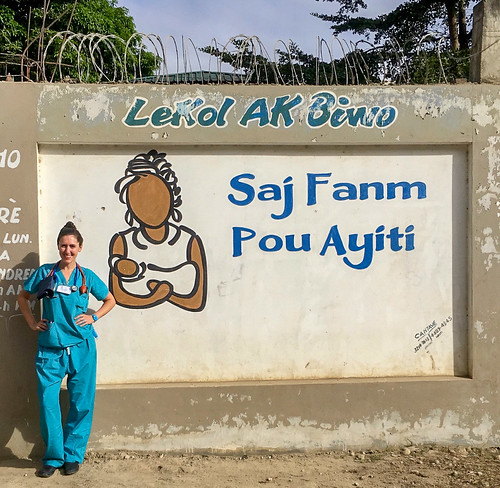Note: This interview is part of a series from Learning Service.
Emily is a Registered Nurse with extensive experience volunteering abroad. She believes that travel can change the world for the better—if we do it right—and she's passionate about helping people find ways to give back to the communities they visit.
Emily blogs about ethical and sustainable travel at Two Dusty Travelers. She lives in Seattle with her husband and their rescue pup, and volunteers often with humanitarian medical missions and disaster response teams.

What motivated your decision to volunteer abroad? How/why did you choose where to go?
I have always loved to travel, but I wanted my trips to mean more than just sitting on the beach—I wanted to make a positive difference in the places I visited. The first time I volunteered abroad, I chose to go to Kenya simply because it was a place I wanted to visit. That experience (and many that came after) taught me that good intentions aren't enough when volunteering. I felt ineffective because I didn't have the skills to truly have an impact.
But that trip inspired me to become a nurse so that I would have more to contribute, and I have been volunteering abroad once or twice a year ever since. Now I choose where to go based on where I can genuinely be most useful to the local community.
How did you find your job? What resources did you use?
I have volunteered abroad with several different organizations. Some I found after spending a LOT of time searching online, and others were recommended to me by colleagues. I do very thorough research before I sign up for any volunteer program. These are a few questions I think it's important to ask every organization.
What was your experience like? Can you share some favorite memories - and challenges?
Each experience has been unique! During my first volunteer abroad trip, I volunteered at an orphanage in Kenya because I didn't know yet that orphanage volunteering is unethical. I felt frustrated because it was obvious early on that playing with kids for a few weeks wasn't making a real difference in their lives.
But I fell in love with my host family, who I'm still close with. My favorite memories from that trip are of sitting around the dinner table, cooking, and talking with my host brothers. My experience in Kenya absolutely altered my worldview and changed my life for the better.

Once I learned more about ethical volunteering, I wanted my experiences to be less about having an amazing time for myself, and more about making a meaningful and lasting difference in a community. As a nurse, I volunteered to help train local birth attendants with Midwives for Haiti and I loved working alongside wonderful Haitian women in remote areas.
I also worked in Sierra Leone during the Ebola outbreak with Partners in Health. That was my most physically and psychologically challenging experience abroad. Our team had to try to figure out how to save lives with very limited resources, while working in sweltering heat inside the protective suits. We saw a lot of death and at times feared for our own health. But I also felt that my presence was genuinely needed, and that I was able to make a real difference.
What skills did you develop from your experience? Do you feel changed from your experience abroad?
My experiences abroad have absolutely changed me. I'm more flexible and patient than I was before, because you have to be in order to live and work in limited resource settings. Specifically as a nurse, I have learned a lot from how local nurses practice in other countries. Just because I do things one way in the US doesn't mean my way is necessarily right.
I've also learned to listen first instead of jumping into a situation with a solution that I think is best. Issues that volunteers hope to address (like poverty, healthcare, and education) are extremely complicated and we're not going to solve them without long-term partnership and leadership from local communities. My naive view that I could change these entrenched issues with a two-week volunteer trip has drastically evolved over the years. I have grown more passionate about transferring power to locals rather than creating a dependence on foreign intervention.
My experiences abroad have also forced me to see my own privilege and prejudices, and to find ways to actively address them.
Has your experience helped you get to where you are today?
Volunteering abroad has definitely helped me in my career. I know that working in Africa stands out on my resume, and that I've gained experience I wouldn't have been able to get anywhere else. But I feel conflicted by that fact, because I don't want to encourage people to volunteer abroad solely to pad their resumes. I know that medical and nursing students are attracted to volunteering in developing countries because they have free reign to do things they wouldn't be able to do in their own countries. I think we need to be careful to make sure that local communities are getting just as much benefit as the volunteers.
Any advice for students thinking about volunteering overseas? What are some highlights or things that you gained or changed your perspective?
My golden rule for volunteering abroad is: Don't do anything you wouldn't do in your own country! Because there are often fewer regulations in developing countries, it can be easy to get a job that you aren't qualified to do - but that doesn't make it OK. If you wouldn't teach school, build a house, or deliver a baby at home, then don't do it abroad.
As a student, make it more about learning than about "serving". It's unlikely that you have more knowledge or experience than the locals who do this work every day. I volunteered abroad as a nursing student, and I'm embarrassed that I thought I would know more than the Kenyan nurses just because I went to school in America. In reality, they knew infinitely more than I did about diseases common to the area, culturally appropriate care, and how to get things done with the limited resources they had.
Instead of stepping in to "fix" things or do the job yourself, take this opportunity to listen and learn from locals.
How has international education impacted or influenced your cultural identity?
International education has made me very aware of my privilege as a white, middle class American. The opportunity to live with and learn from people of other cultures has made me very passionate about social justice and confronting the racism that continues to permeate our world. I'm so grateful for that education opening my eyes to the power I have to speak up about injustice!
Is there anything else you’d like to share with us?
If there are any medical professionals or students reading this, I’d be happy to talk more about getting involved in medical “missions”. Even skilled volunteers can sometimes do more harm than good, and it’s very daunting to figure out where to start and what organizations to trust. I get a lot of questions about medical volunteering, so I tried to answer the most common ones here.

#VolunteerAbroadBecause You Can Learn From Locals
Claire Bennett lives and works in Kathmandu, where she owns a training company, works freelance as a consultant in development and education, and leads study abroad programs for teenagers. She is the co-author of Learning Service: The Essential Guide to Volunteering Abroad.
All photos courtesy and copyright Emily, Two Dusty Travelers
